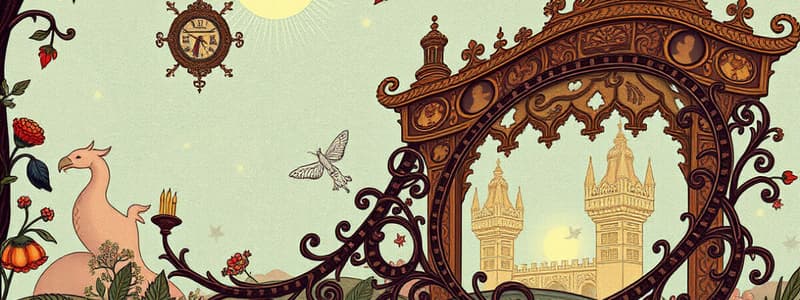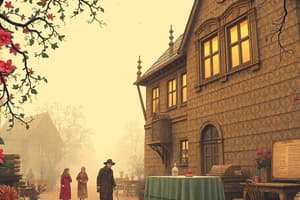Podcast
Questions and Answers
What is the Dutch word for 'Friday'?
What is the Dutch word for 'Friday'?
- zaterdag
- donderdag
- maandag
- vrijdag (correct)
The word 'lente' refers to autumn in Dutch.
The word 'lente' refers to autumn in Dutch.
False (B)
What is the Dutch translation for 'the month'?
What is the Dutch translation for 'the month'?
de maand
In Dutch, 'June' is referred to as __________.
In Dutch, 'June' is referred to as __________.
Match the following months of the year with their Dutch translations:
Match the following months of the year with their Dutch translations:
What is the correct Dutch term for 'above'?
What is the correct Dutch term for 'above'?
The phrase 'hoe laat is het?' in Dutch means 'What time is it?'
The phrase 'hoe laat is het?' in Dutch means 'What time is it?'
'The moon' translates to __________ in Dutch.
'The moon' translates to __________ in Dutch.
What is the Dutch word for 'the sweater'?
What is the Dutch word for 'the sweater'?
The Dutch word 'verloofd' means 'to be engaged'.
The Dutch word 'verloofd' means 'to be engaged'.
What does 'honderd' mean in English?
What does 'honderd' mean in English?
The Dutch word for 'the bus' is __________.
The Dutch word for 'the bus' is __________.
Match the following Dutch terms with their English meanings:
Match the following Dutch terms with their English meanings:
Which of the following means 'to listen' in Dutch?
Which of the following means 'to listen' in Dutch?
'Twintig' means 'twenty' in Dutch.
'Twintig' means 'twenty' in Dutch.
What does 'de verjaardag' refer to?
What does 'de verjaardag' refer to?
In Dutch, 'to travel' is __________.
In Dutch, 'to travel' is __________.
What is the Dutch word for 'beautiful'?
What is the Dutch word for 'beautiful'?
What is the Dutch word for 'the library'?
What is the Dutch word for 'the library'?
The Dutch word 'de jas' translates to 'the hat'.
The Dutch word 'de jas' translates to 'the hat'.
What is the Dutch word for 'to call'?
What is the Dutch word for 'to call'?
The Dutch word for 'high' is ___ .
The Dutch word for 'high' is ___ .
Match the following Dutch words with their English meanings:
Match the following Dutch words with their English meanings:
Which of these is the correct translation for 'to live'?
Which of these is the correct translation for 'to live'?
The word 'zacht' means 'soft' in Dutch.
The word 'zacht' means 'soft' in Dutch.
What is the Dutch word for 'the farmer'?
What is the Dutch word for 'the farmer'?
___ is the Dutch term for 'autumn'.
___ is the Dutch term for 'autumn'.
Match the number with its Dutch word:
Match the number with its Dutch word:
What does 'de sporthal' refer to?
What does 'de sporthal' refer to?
The word 'de tulp' means 'the rose'.
The word 'de tulp' means 'the rose'.
What is the translation of 'good evening' in Dutch?
What is the translation of 'good evening' in Dutch?
The Dutch word for 'to eat' is ___.
The Dutch word for 'to eat' is ___.
Which of these words translates to 'the sock'?
Which of these words translates to 'the sock'?
What is the Dutch word for 'the boy'?
What is the Dutch word for 'the boy'?
The Dutch word for 'the glasses' is 'de bril'.
The Dutch word for 'the glasses' is 'de bril'.
What does 'goedkoop' mean in English?
What does 'goedkoop' mean in English?
The word for 'the swimming pool' in Dutch is _______.
The word for 'the swimming pool' in Dutch is _______.
Match the following Dutch words with their English meanings:
Match the following Dutch words with their English meanings:
Which of the following translates to 'the contract'?
Which of the following translates to 'the contract'?
The Dutch word for 'to speak' is 'vragen'.
The Dutch word for 'to speak' is 'vragen'.
What is the Dutch term for 'the company car'?
What is the Dutch term for 'the company car'?
In Dutch, 'at night' translates to _______.
In Dutch, 'at night' translates to _______.
What does 'vijftien' mean in English?
What does 'vijftien' mean in English?
The term 'de woonkamer' refers to the 'living room'.
The term 'de woonkamer' refers to the 'living room'.
Translate 'to lose' into Dutch.
Translate 'to lose' into Dutch.
Match the month in Dutch with its English translation:
Match the month in Dutch with its English translation:
The translation for 'the fridge' in Dutch is _______.
The translation for 'the fridge' in Dutch is _______.
What does 'ik ben' mean?
What does 'ik ben' mean?
What is the Dutch word for 'the beach'?
What is the Dutch word for 'the beach'?
What is the Dutch word for 'hello'?
What is the Dutch word for 'hello'?
The word 'huis' means 'the girl' in Dutch.
The word 'huis' means 'the girl' in Dutch.
What is the Dutch term for 'thank you'?
What is the Dutch term for 'thank you'?
In Dutch, 'de vrouw' means the ______.
In Dutch, 'de vrouw' means the ______.
Match the Dutch words with their English meanings:
Match the Dutch words with their English meanings:
What does 'de groente' mean?
What does 'de groente' mean?
The word 'slecht' means 'good' in Dutch.
The word 'slecht' means 'good' in Dutch.
Translate 'the prime minister' into Dutch.
Translate 'the prime minister' into Dutch.
The Dutch word for 'the road' is ______.
The Dutch word for 'the road' is ______.
Which of the following means 'to eat' in Dutch?
Which of the following means 'to eat' in Dutch?
The phrase 'tot ziens' translates to 'goodbye' in Dutch.
The phrase 'tot ziens' translates to 'goodbye' in Dutch.
How do you say 'big' in Dutch?
How do you say 'big' in Dutch?
'De fiets' refers to ______.
'De fiets' refers to ______.
What is the Dutch word for 'to walk'?
What is the Dutch word for 'to walk'?
Flashcards are hidden until you start studying
Study Notes
Vocabulary Lessons Overview
- The course consists of 20 lessons that cover the 1000 most common words in Dutch.
- Each lesson focuses on a specific theme, presenting fundamental vocabulary essential for basic communication.
Key Vocabulary from Lessons 1-20
-
Basic Pronouns & Greetings (Lesson 1)
- "ik" means "I", "hij" means "he", "zij" means "she".
- Common greetings include "hallo" (hello), "goedemorgen" (good morning), and "tot ziens" (see you).
-
Basic Questions & Particles (Lesson 5)
- Question words like "wie" (who), "wat" (what), and "waar" (where) build fundamental communication skills.
- Essential conjunctions and prepositions: "en" (and), "maar" (but), "omdat" (because).
-
Daily Life Vocabulary (Lesson 4)
- Focus on food and drink: "de groente" (vegetables), "het brood" (bread), "de melk" (milk).
- Specific Dutch foods include "de stroopwafel" (syrup waffle) and "de frikadel" (Dutch meat sausage).
-
Transportation and Locations (Lesson 6)
- Common transport terminology: "de auto" (car), "de trein" (train), "de bus" (bus).
- Locations important for daily activities: "de supermarkt" (supermarket), "de bibliotheek" (library).
-
Numbers and Time (Lesson 7 & 10)
- Basic counting includes "nul" (zero) to "miljoen" (million).
- Days of the week: "maandag" (Monday) to "zondag" (Sunday), along with months and seasonal terms like "lente" (spring) and "herfst" (autumn).
-
Common Verbs (Lesson 8)
- Essential verbs include "lopen" (to walk), "hebben" (to have), and "zien" (to see), allowing for important actions in conversation.
-
Adjectives for Descriptions (Lesson 9)
- Descriptive adjectives like "groot" (big), "mooi" (beautiful), and "lekker" (tasty) enhance communicative effectiveness regarding objects and experiences.
Prepositions and Places (Lesson 11)
- Prepositions such as "met" (with) and "voor" (in front of) are fundamental for constructing sentences about locations.
- Important places are covered, including "het ziekenhuis" (hospital) and "het politiebureau" (police station).
Additional Vocabulary Themes
- Time and Events (Lesson 12)
- Questions about time like "hoe laat is het?" (what time is it?) help in social interactions.
- Contextual vocabulary regarding events such as "het concert" (the concert) and "de sporthal" (the sports hall).
Reverse Vocabulary (Shuffled Words)
- Words from previous lessons are shuffled to aid in recall and comprehension.
- This includes phrases and essential objects such as "de ring" (the ring road) and "de klasgenoot" (classmate).
Special Themes
- Emphasis on cultural terms such as "de wallen" (red light district) can provide context for conversations about areas in Dutch cities.
- Incorporation of food-related vocabulary reflects Dutch cuisine and essential culinary terms.### Vocabulary and Phrases
- Useful phrases for telling time, such as "twee uur" meaning "two o'clock" and "kwart voor zeven" meaning "quarter to seven."
- Common nouns include "de trui" for "the sweater" and "de opa" for "the grandfather."
- Numbers and counting: "honderd" means "hundred," "twintig" means "twenty," and "miljoen" translates to "million."
Verbs in Dutch
- Common action verbs include "hebben" (to have), "zien" (to see), "drinken" (to drink), and "lopen" (to walk).
- Other verbs signify emotional or relationship states, like "verloofd" (to be engaged) and "verliefd" (in love).
- Actions related to work or education: "solliciteren" (to apply), "ontslagen" (to fire), and "leren" (to learn).
Common Objects and Places
- Household items: "het fornuis" (the cooker), "de lamp" (the lamp), and "de koelkast" (the fridge).
- Locations include "het park" (the park), "de slaapkamer" (the sleeping room), and "de woonkamer" (the living room).
- Types of food: "de pannenkoek" (the pancake), "de pindakaas" (the peanut butter), and "de friet" (the French fries).
Days and Months
- Days of the week: "maandag" (Monday), "dinsdag" (Tuesday), "zondag" (Sunday).
- Months: "december" (December), "april" (April), "juni" (June), and "oktober" (October).
Family and Relationships
- Family terms include "de oma" (the grandmother), "de vader" (the father), "de neef" (the cousin) and "de tante" (the aunt).
- Social interactions: "leuk vinden" (to like), "vrienden" (friends), "de kennis" (the acquaintance).
Miscellaneous Vocabulary
- Descriptive adjectives such as "mooi" (beautiful), "arm" (poor), and "duur" (expensive).
- Everyday situations: "buiten" (outside), "overdag" (during the day), "s nachts" (at night), and "eten" (to eat).
Key Expressions
- Formality in requests using "alsjeblieft" (please) and "alstublieft" (here you are).
- Expressions to indicate time like "vijf voor acht" (five to eight) and "om tien uur" (at ten o'clock).
- Common conversational fillers, such as "hoe laat?" (what time?) and "wat?" (what?).
Educational Context
- Emphasis on practical vocabulary useful for daily conversations and general understanding of the Dutch language for learners.
- The vocabulary listed covers a wide range of themes, aiding in conversational fluency and comprehension.
Studying That Suits You
Use AI to generate personalized quizzes and flashcards to suit your learning preferences.




